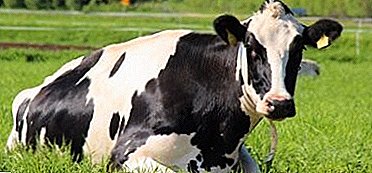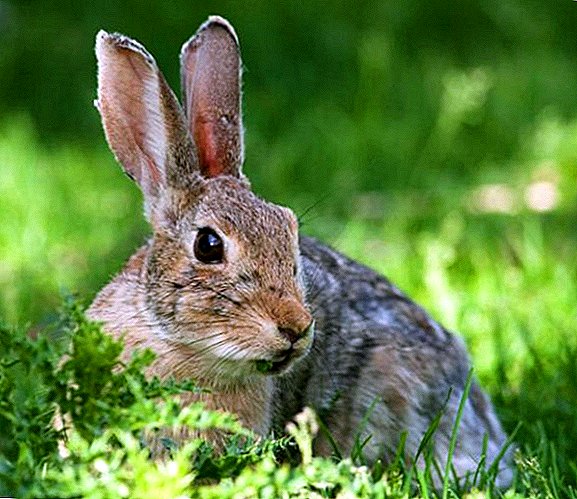 People who breed rabbits are well aware that they have an excellent appetite. Animals can chew at least a whole day, but when the appetite disappears and at the same time the animal begins to grit its teeth, this is a cause for concern, since this situation speaks of a problem with Fuzzy. Consider why this occurs and how to handle it.
People who breed rabbits are well aware that they have an excellent appetite. Animals can chew at least a whole day, but when the appetite disappears and at the same time the animal begins to grit its teeth, this is a cause for concern, since this situation speaks of a problem with Fuzzy. Consider why this occurs and how to handle it.
The reasons why the rabbit grit its teeth
If the rabbit publishes a constant gnashing of teeth and at the same time they hear a knock about each other - this suggests that the pet is in pain.
Did you know? A rabbit weighing 2 kg and a dog weighing 10 kg drink the same amount of water at a time.If at the same time he loses his appetite, then this is an alarming sign, and this has its own reasons:
- discomfort arose in the mouth;
- problems with the digestive tract;
- diet is wrong;
- infections and stress;
- irritation when touching the animal.

Oral Discomfort
Causes of pain in the oral cavity can be:
- wounds on the tongue, cheeks, obtained from improper bite;
- jaw dislocation;
- too long front teeth;
- incisors diverge to the sides;
- sores in the mouth from overly spicy foods.
If the rabbit stops eating, you need:
- Check the oral cavity for wounds.
- Inspect teeth for damage.
Important! In case of any pathology in the oral cavity, it is not necessary to self-medicate, but immediately consult a veterinary clinic for advice.In order for the pet not to be injured from long, protruding teeth, they must be cut with a special tool, since the incisors of the animal grow constantly, for a month they are extended by 10 mm.

Problems with the digestive tract
Like all animals, rabbits also have digestive problems, which are manifested by abdominal distention, diarrhea or constipation, but they appear due to such reasons:
- poor quality feed;
- the content does not meet sanitary standards;
- a dramatic change in food in the diet;
- parasites in the body;
- ingestion of wool or various items.
Important! In case of diarrhea and vomiting, the animal must be urgently shown to the veterinarian, as these may be signs of an infectious disease.To get rid of problems with the digestive tract, you must:
- Constantly clean the cages where animals are kept.
- Monitor the quality of feed.
- Introduce new products gradually, in small portions.
- Give pets antihelminthic drugs.

Wrong diet
When feeding rabbits only with fruits and vegetables, they may develop renal failure, liver problems and inflammation of the appendix - all this leads to a deterioration in appetite. You need to know that the basis of the diet of these rodents are hay and dried grass, and vegetables and fruits are just a treat.
Infections
Infectious diseases pose a serious danger to the life of the rabbit. Viruses and microbes, entering the body, lead to malfunction of the internal organs and, as a result, intoxication of the body. Each infection has its own manifestations, but one thing is common for everyone - depression, loss of appetite and gnashing of teeth. Only a veterinarian can establish a diagnosis and prescribe treatment. Self-medication can cause the death of an animal.
Familiarize yourself with the symptoms, methods of treatment and prevention of rabbit diseases.
Stress
Rabbits are very shy and tender little animals. An unstable nervous condition can be caused by:
- sharp noise;
- a trip by car;
- the arrival of guests;
- other animals.
 Immediately after the purchase, when the animal gets into an unknown situation, he experiences stress, but after mastering after a certain period of time, eared fish calms down and his appetite is getting better.
Immediately after the purchase, when the animal gets into an unknown situation, he experiences stress, but after mastering after a certain period of time, eared fish calms down and his appetite is getting better.Annoyed or displeased
A rabbit, like other animals, is not good at what they do against their will. If he is in excellent spirits, then publishes a barely noticeable creaking of his teeth - this is a sign of pleasure and tranquility. When he is being stroked and he likes it, besides the rattle his pet can hardly hear his teeth.
Did you know? In a rabbit, there are three degrees of the state of aggression, and they can be determined by the state of the ears. Warning - ears turned to the sides and slightly down towards the back. Willingness to attack - ears strictly above, and their inner side is turned back. The highest degree of discontent - ears to the maximum pressed to the back, and in any careless movement from the side of the rabbit will attack.In case of irritation or unwillingness to be touched, the rabbit starts to shake his head quickly and to grind his teeth strongly. At such moments, the animal can make a lunge in your direction. It is better not to touch the pet and let it calm down.

Preventive measures
In order to avoid problems with the appetite and gnashing of teeth of your pets, it is necessary:
- Observe good nutrition, which should include coarse food.
- Protect the animal from stress: without the need do not carry the cage, protect the animal from noise and other pets.
- Do not refuse vaccinations.
- After around the rabbit, be sure to provide peace and good nutrition.
- The diseased animal should be isolated from the main herd for diagnosis and elimination of the infection.
It will be interesting for you to read about what affects the lifespan of rabbits, how to increase their immunity, why rabbits grow poorly and do not gain weight, and also learn how to properly cut the claws of rabbits and how to protect them from mosquitoes.
Gnashing of teeth in rabbits is not always a cause for concern, sometimes it is just a manifestation of pleasure, but if a rabbit grit its teeth for a long time and its appetite is lost, this is a reason to contact a veterinarian for an accurate diagnosis and treatment.












